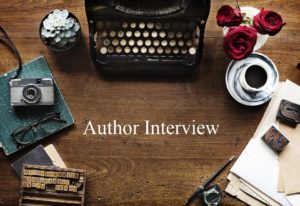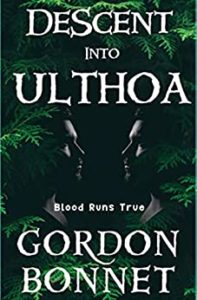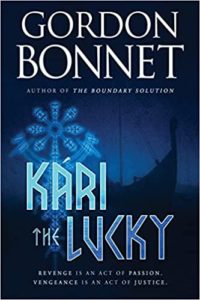An Interview with Gordon Bonnet
 Gordon Bonnet and I would have a lot to talk about should we ever meet in person. He’s a former science teacher and a runner and “is never without a piece of fiction in progress.” Kindred spirits, I tell you! All that writing has been fruitful—he has nineteen published novels, and two of them, Descent into Ulthoa and Kári the Lucky, released just this month! And readers are enjoying both books. One reviewer wrote of Descent, “This is a classic Bonnet title, riveting, descriptive, tense, and full of characters who range from gracious to creepy,” while another pointed out their love of Gordon’s writing style with respect to Kári. Like every other author I’ve interviewed, Gordon leads a full and busy life, so I’m grateful he spent the time to thoughtfully answer my questions.
Gordon Bonnet and I would have a lot to talk about should we ever meet in person. He’s a former science teacher and a runner and “is never without a piece of fiction in progress.” Kindred spirits, I tell you! All that writing has been fruitful—he has nineteen published novels, and two of them, Descent into Ulthoa and Kári the Lucky, released just this month! And readers are enjoying both books. One reviewer wrote of Descent, “This is a classic Bonnet title, riveting, descriptive, tense, and full of characters who range from gracious to creepy,” while another pointed out their love of Gordon’s writing style with respect to Kári. Like every other author I’ve interviewed, Gordon leads a full and busy life, so I’m grateful he spent the time to thoughtfully answer my questions.
Christina: Congrats on your latest book, Descent into Ulthoa, which centers around the disappearance of two people who “had been swallowed by the silent, brooding forest, leaving not a trace of what had happened or where they went.” How does the book differ from your past work? Are there any similarities? For those new readers among us, do you have any themes in particular you like to explore in your work?
Gordon: Descent is in the genre I usually write—speculative fiction—but that is a very broad umbrella. I’ve written stories about time travel, people meeting mythological figures, conspiracies, ghosts, aliens… you name it. Descent is different because it’s a little darker than most of my books. I have a thing for happy endings, and I don’t think it can be classified as “happy” (although I hope the resolution is satisfying to read).
I do have some themes I seem to keep coming back to. A common one in my writing is, how do you know whether what you’re seeing is real? If you’re confronted with something wildly outside of your worldview, it could be real; you could be misinterpreting what you see; it could be a hallucination; it could be someone tricking you. How can you tell the difference? Just about all of my characters end up in situations where they are challenged by a world that is not at all what they thought. How ordinary people respond to extraordinary circumstances is something I revisit over and over.
Christina: When it rains, it pours, right? Kári the Lucky released two weeks before Descent into Ulthoa. How did you manage the pressure of two book launches within such a short span of time? Do you have any tips for other authors who might find themselves in that same (wonderful) situation?
Gordon: The fact that these two came out two weeks apart was pure happenstance! I have two publishers I work with, and those release dates just happened to be the ones they wanted. I’m hoping to do some promotion for both, but to be frank, I’m terrible at self-promotion!
If someone’s in the situation of having two close release dates, just take things one step at a time! Once you’ve met the deadlines for things like galley edits, there’s very little that has to be done right now. Just relax, enjoy it, and go with things as they come.
Christina: In an interview with J Scott Coatsworth, you talk about what you write (“speculative fiction”) and how you’d describe it: “as taking the world and tweaking some of the rules, and seeing what happens.” How organic is your process? What’s been the most surprising thing to happen?
Gordon: The general gist of a book is something I usually have right from the beginning, along with one or two of the main characters. I would love to know where inspiration comes from; usually it’s like a lightning strike, unexpected and powerful. I tend to think in images, so often my stories start with one image that I then have to figure out.
For example, I came up with my short story “The Hourglass” because of picturing two men—total strangers—at a pub. I can see the place vividly in my mind’s eye. The bartender brings them both a pint of beer, and they’d both ordered Guinness. This starts a conversation… I had to write the rest of the story to find out what that conversation was about, and the result was described by a friend as “the single most brain-bending short story she’d ever read.” All from one powerful visual image.
Sometimes things don’t go as planned, and that’s often when the writing process is going very right. The only way I can describe it is, it’s like one of the characters reaches out and grabs the keyboard and starts writing a different story. One particularly striking example is in my novella Convection, about seven people trapped in an apartment complex during a category-4 hurricane. One of them, Jennie, was originally conceived as being the annoying, bitchy foil for the other characters, someone who never had a positive thing to say and whom the others had to work around. About midway through, Jennie decided she wanted a different role—and she becomes one of the most complex, sympathetic characters in the entire story. I love it when that kind of thing happens!
Christina: You’ve authored blog posts, short stories, novellas, and novels and have published everything from sci-fi to mystery to historical fiction. Are you drawn to one form or genre more than the other? How do you decide if your work will become, for example, a sci-fi short story versus a novel of historical fiction?
Gordon: I’ve been blogging for almost eleven years, six days a week, almost without fail. The topic is skepticism and science, both near and dear to my heart. My blog, Skeptophilia, has spawned a YouTube channel—it’s grown beyond my wildest dreams. I just crossed three million lifetime hits, something I couldn’t have imagined when I started it.
Other than that—just about all of my stories have some kind of paranormal element. That’s the unifying characteristic. Even the murder mysteries have that feature; the detective agency in the series is comprised of psychics. Kári the Lucky is my only historical fiction thus far, and came out of my background in Scandinavian history (my MA is in historical linguistics, and that was the focal area for my thesis). While I was in graduate school, as part of my studies I read a lot of the classic Icelandic saga literature, and when I read Njál’s Saga—about an 11th-century blood feud—I thought, “This would make an amazing novel!” Kári the Lucky is what resulted, taking the story and turning it around to put it in the point-of-view of someone whom (in the original work) is actually a rather minor character. But—he’s the only one who survives to the very end, so telling the story through his eyes makes sense. I hope I did the story justice.
Christina: You used to teach high school biology. Did that job inform your writing at all? Did your interactions with your students inform your writing? What’s the greatest lesson you’ve learned from one of your students?
Gordon: I taught biology for 32 years—just retired in 2018, right before the pandemic started (this is called “accidental good timing”). I certainly have used my background in science in a lot in my stories, as well as my knowledge of teenagers. And in my current work-in-progress, a fall-of-civilization story called In the Midst of Lions, I use my experiences teaching autistic children to create one of the characters, a fascinating boy named Perry Abraham who is loosely based on several kids from my classes over the years.
As far as what I learned as a teacher—I think the primary one was “don’t take yourself so seriously.” I’ve always been an intense, rather tightly-wound person, and learning how to laugh at myself was a valuable lesson.
Christina: Your Twitter bio reads, “Novelist, musician, runner, cryptozoology buff, tattoo enthusiast, wine lover, bisexual & proud.” Did you have any trouble when considering the order of those categories? If you could only be one of those, which would it be and why? Do you think the people who know you best might add anything to the list? And if so, what would it be?
Gordon: Interesting question! Novelist came first because that’s really how I see myself—as a storyteller, first and foremost, and that’s the one I’d keep if I was pressed to choose. The others are about equal in my mind, but are all important facets of who I am. The last one—bisexual—is a deeply important one to me, because I only came out six years ago although I knew I was bisexual when I was fifteen years old. Growing up in a conservative religious family in southern Louisiana made keeping that secret a no-brainer, although in retrospect I wish I had come out a lot earlier. Not only would that have given me the opportunity to live more authentically instead of hiding and feeling shame for decades, I would have been a role model for my students. But you can’t change the past. It’s like Maya Angelou said: “Do the best you can until you know better. Then when you know better, do better.”
As far as what my friends and family might add… amateur potter, traveler, gardener, sun worshiper, Cajun boy exiled to the frozen North…
Christina: Prosopagnosia, or face blindness, is something you live with and used in one novel, Face Value. How do you think having prosopagnosia affects your writing or writing process?
Gordon: One of the main ways my face blindness affects my writing is that I don’t form mental images of faces at all—right now, sitting here, I can’t picture my own face. I know I have long sandy-blond hair, blue eyes, a bit of facial hair, and so on—but it doesn’t come together into any kind of picture. So I always have to make sure I visually describe characters, because it’s not something that naturally occurs to me, yet is so often critical to the story.
The odd thing is how long it took me to figure out I was face blind. I grew up thinking first of all that no one else could picture faces, either; and second, that my inability to recognize people was just due to being unobservant or forgetful. I finally figured it out when I introduced myself on three successive weeks to the same person. The third time, she looked at me like I had a screw loose, and said, “Do you really not know who I am?” I had no clue. At that point, I started looking into it, and found out it’s an actual condition, thought to be a miswiring in the fusiform gyrus—the facial recognition module in the brain.
I’ve gotten really good at remembering particular features, noticing how people hold their bodies and how they move, and (especially) voices. I’ve become really good with voices. Face Value was a fun story to write, because it gave me a chance to explore a character who saw the world like I do.
Christina: I enjoy catching up with other authors on Twitter, and there, you’ve posted several times about Doctor Who, one of my family’s favorite shows. So I have to ask: Do you have a favorite Doctor? If so, what makes them your favorite?
Gordon: I am a total Who fanboy. It’s my one and only real obsession when it comes to television and movies; I’m honestly not much of a TV or movie watcher, with this exception. I absolutely love this show and will discuss Who trivia with other fans, ad nauseam.
What’s funny is that I am a latecomer to the Who fandom. My wife, who had been a fan of Who for years, got me to watch the classic episode “Blink,” followed by “Empty Child” and “Silence in the Library.” I was hooked. And lived up to my dad’s quip that I was the kind of person who tests the depth of a river with both feet.
I think the Tenth Doctor—David Tennant—is my favorite, but I have to say Thirteen—Jodie Whittaker—is a close second. The screenwriting for Jodie Whittaker hasn’t been all that good, but her portrayal of the Doctor is spot-on, capturing the humor and whimsy but also the deadly seriousness of who she is and what her role is. My absolute favorite episodes, though, are the ones with David Tennant and Catherine Tate (Donna Noble). The interplay of those two characters was absolute magic. I think I could watch “Turn Left” and “The Fires of Pompeii” and “The Unicorn and the Wasp” a hundred times each and still not get tired of them.
Gordon can be found in multiple places!
Website: https://www.gordonbonnet.com/
Instagram: @skygazer227
Twitter: @TalesOfWhoa
Facebook: @gordon.bonnet
Thanks to Gordon for agreeing to this interview! If you know of an author who’d like to be featured in an interview (or you are an author who would like to be featured), feel free to leave a comment or email me via my contact page.



I always love reading interview questions from my favourite authors. Great exchange, Christina and Gordon!
Thanks for reading! I loved these answers. So insightful. I’m grateful that Gordon agreed to the interview!
This is probably one of the best author interviews I’ve ever read. In-depth and full of significant details that now have me making lists of things to read and catch up on. I’ve known this author all my life but every time I hear more of his whip smart creation pool…. I glean a few enjoyable bits to watch or read. Always worth it.
Appreciate you reading! This interview was a lot of fun to conduct.
It was indeed a great interview! I would never expect anything but the best from Gordon. I am so very proud of him. I was one of his high school.English teachers.
What a great privilege to have you comment here! Thank you for reading. Can’t wait to see what Gordon comes up with next!